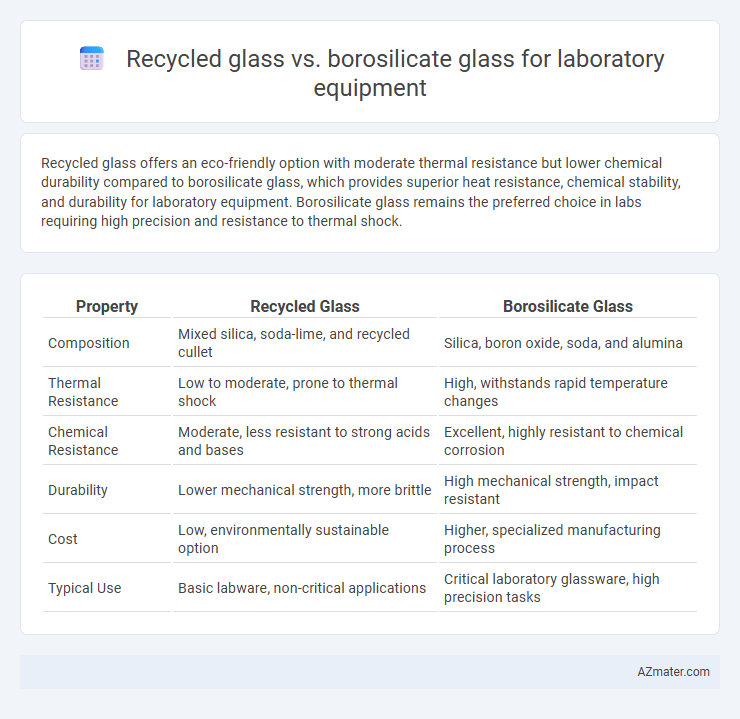Recycled glass offers an eco-friendly option with moderate thermal resistance but lower chemical durability compared to borosilicate glass, which provides superior heat resistance, chemical stability, and durability for laboratory equipment. Borosilicate glass remains the preferred choice in labs requiring high precision and resistance to thermal shock.
Table of Comparison
| Property | Recycled Glass | Borosilicate Glass |
|---|---|---|
| Composition | Mixed silica, soda-lime, and recycled cullet | Silica, boron oxide, soda, and alumina |
| Thermal Resistance | Low to moderate, prone to thermal shock | High, withstands rapid temperature changes |
| Chemical Resistance | Moderate, less resistant to strong acids and bases | Excellent, highly resistant to chemical corrosion |
| Durability | Lower mechanical strength, more brittle | High mechanical strength, impact resistant |
| Cost | Low, environmentally sustainable option | Higher, specialized manufacturing process |
| Typical Use | Basic labware, non-critical applications | Critical laboratory glassware, high precision tasks |
Introduction to Laboratory Glassware Materials
Recycled glass in laboratory equipment offers an eco-friendly alternative with comparable durability and chemical resistance to traditional materials but may exhibit slight variability in thermal shock resistance. Borosilicate glass remains the industry standard for laboratory glassware due to its superior thermal stability, low thermal expansion coefficient (approximately 3.3 x 10-6 /degC), and high resistance to chemical corrosion. Selection between recycled and borosilicate glass depends on specific application requirements, balancing sustainability goals with performance criteria such as heat resistance and chemical inertness.
What is Recycled Glass?
Recycled glass for laboratory equipment is made from post-consumer or post-industrial glass waste that is melted down and reformed to create new glass products, reducing raw material consumption and environmental impact. This type of glass is often used in non-critical lab applications where chemical resistance and thermal durability requirements are lower than those for borosilicate glass. Borosilicate glass, in contrast, contains boron oxide, providing superior thermal resistance, chemical stability, and mechanical strength essential for precise scientific experiments.
What is Borosilicate Glass?
Borosilicate glass is a type of laboratory glass known for its exceptional thermal resistance, chemical durability, and low thermal expansion, making it ideal for experiments involving high temperatures and corrosive substances. Unlike recycled glass, which can contain impurities affecting strength and clarity, borosilicate glass is manufactured with precise chemical composition to ensure consistency and reliability in laboratory equipment such as beakers, flasks, and test tubes. Its superior resistance to thermal shock and chemical corrosion makes borosilicate glass the preferred material for high-performance scientific applications.
Chemical Resistance: Recycled vs Borosilicate Glass
Borosilicate glass exhibits superior chemical resistance, withstanding strong acids, alkalis, and solvents without degradation, making it ideal for laboratory applications requiring durability. Recycled glass, while environmentally beneficial, often lacks the consistent chemical resistance of borosilicate due to variable purity and composition. Laboratories prioritize borosilicate glass for its reliable inertness and resistance to thermal shock in chemical experiments.
Thermal Stability Comparison
Recycled glass in laboratory equipment offers moderate thermal stability but typically exhibits lower resistance to thermal shock compared to borosilicate glass. Borosilicate glass features a low coefficient of thermal expansion (around 3.3 x 10-6 /degC), allowing it to withstand rapid temperature changes without cracking, making it ideal for high-temperature laboratory applications. In contrast, recycled glass often lacks this precise composition control, resulting in less consistent thermal durability and suitability for less demanding thermal conditions.
Mechanical Strength and Durability
Borosilicate glass exhibits superior mechanical strength and durability compared to recycled glass, making it ideal for demanding laboratory environments where thermal shock resistance and chemical stability are critical. Recycled glass, while environmentally beneficial, often contains impurities and structural inconsistencies that reduce its toughness and resistance to breakage under mechanical stress. Laboratories prioritize borosilicate glass for its proven reliability and extended lifespan in handling rigorous experimental procedures and repeated thermal cycling.
Sustainability and Environmental Impact
Recycled glass significantly reduces the demand for raw materials and lowers energy consumption during production, making it a sustainable option for laboratory equipment with a smaller environmental footprint. Borosilicate glass, known for its thermal resistance and durability, is less energy-intensive in manufacturing but typically requires virgin raw materials, impacting sustainability. Choosing recycled glass promotes circular economy principles by minimizing waste and greenhouse gas emissions, whereas borosilicate glass prioritizes performance but with higher environmental costs.
Cost Analysis and Economic Considerations
Recycled glass offers a cost-effective alternative for laboratory equipment due to lower raw material expenses and reduced energy consumption in production, making it economically attractive for large-scale manufacturing. Borosilicate glass, while more expensive upfront, provides superior chemical resistance, thermal shock resistance, and durability, reducing replacement frequency and long-term operational costs in high-precision laboratory environments. Economic considerations between the two materials must balance initial investment against lifecycle performance, with recycled glass favored for budget-sensitive applications and borosilicate glass preferred for high-performance laboratory needs.
Applications in Laboratory Settings
Recycled glass is commonly used in laboratory settings for non-critical containment such as beakers and sample storage due to its cost-effectiveness and environmental benefits. Borosilicate glass is preferred for applications requiring high thermal and chemical resistance, including test tubes, pipettes, and reaction vessels subjected to rapid temperature changes or corrosive chemicals. The choice between recycled glass and borosilicate glass directly impacts the durability, heat tolerance, and precision of laboratory equipment.
Choosing the Right Glassware for Your Laboratory
Recycled glass laboratory equipment offers an eco-friendly option with moderate thermal resistance, making it suitable for non-extreme temperature applications, while borosilicate glass excels in chemical durability and can withstand rapid temperature changes up to 500degC. Borosilicate glass is preferred for precise scientific experiments due to its low thermal expansion and high resistance to corrosion from acids and bases. Selecting the right glassware depends on experimental conditions, where borosilicate is ideal for high-heat or chemically aggressive environments, and recycled glass provides sustainable alternatives for standard lab uses.

Infographic: Recycled glass vs Borosilicate glass for Laboratory equipment
 azmater.com
azmater.com